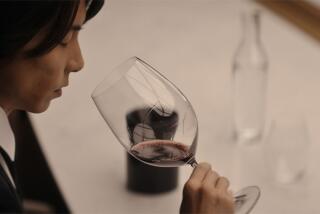He Admired the Wine : The French Offer a Toast to Jefferson
- Share via
PARIS — A display case in the window of Lucien Legrand’s wine shop, one of the oldest in Paris, honors Thomas Jefferson these days for his often-stated belief that “the inhabitants of a country where wine is sold at reasonable price can never become alcoholic.”
In the case are a print of Jefferson, two Jefferson nickels, a host of French and American flags and the French translation of a letter written by Jefferson as President to his secretary of the Treasury in 1807. In the letter, Jefferson proposed a decrease in the tariff on inexpensive imported wines, thus encouraging Americans to drink them rather than whiskey--”a great gain to the Treasury and the sobriety of our country.”
Wine dealer Legrand is paying tribute to Jefferson to complement recent celebrations by France’s wine-producing region of Burgundy to mark the 200th anniversary of a visit there by Jefferson while he was the American minister, or ambassador, to France from 1784 to 1789.
Jefferson’s Injured Wrist
The celebrations are doubtless so much ballyhoo, since Jefferson made the voyage mainly to soak an injured right wrist in the mineral waters of Aix-en-Provence, stopped en route in Burgundy for barely more than a week on a 3 1/2-month trip and may have preferred Bordeaux to Burgundy wine in any case. The French are eager to lure back the American tourists who last summer were frightened away by the threat of terrorism.
But, as part of the celebrations, the University of Dijon brought international scholars to France to discuss Jefferson. The combination of ceremony and scholarship has helped to focus attention on this little-known period of Jefferson’s life, his five years in France when he witnessed the beginnings of the French Revolution, learned to appreciate great wine and cuisine and may have experienced the most important love affair--or perhaps two love affairs-- of his life.
Envoy at End of War
The assignment to France marked the only time that Jefferson ever left North America. He served as the American envoy after the end of the Revolutionary War, during the provisional period before the adoption of the U.S. Constitution and the inauguration of George Washington as the first U.S. President.
The French adventure excited Jefferson, and the memories persisted.
“A more benevolent people I have never known,” he wrote about the French 30 years after he left Paris, “nor greater warmth and devotedness in their select friendships. Their kindness and accommodation to strangers is unparalleled.”
In a controversial biography published in 1974, Fawn M. Brodie, a professor of history at UCLA, concluded that Jefferson, during his stay in Paris, had an unhappy love affair with Maria Cosway, the wife of an English painter, and later took as his mistress Sally Hemmings, the teen-age, quadroon slave who escorted his 8-year-old daughter from America to Paris. Several children, according to Brodie, were born of Jefferson’s relationship with Hemmings, which the biographer said lasted until his death in 1826.
Although much of Brodie’s romantic evidence has a plausible ring, her conclusions, especially about the slave mistress, have not been widely accepted in the academic world. Frank Shuffleton of the University of Rochester, for example, a specialist on the 20,000 letters written by Jefferson during his lifetime, said recently that he believed Brodie exaggerated the significance of the romantic letters sent by Jefferson, a 43-year-old widower, to Cosway.
“You have to read those letters in the context of all the others Jefferson wrote,” said Shuffleton, visiting Dijon for the university seminar on Jefferson. “He would write the same kind of letters to women that he obviously had no interest in. He may have wanted to have an affair with Maria Cosway. But I subscribe to the theory that Jefferson was sexually awkward. He didn’t know how to get started in an affair.
“As for Sally Hemmings,” Shuffleton went on. “I do not accept that at all.”
Walk Along the Seine
Whether or not Jefferson had a love affair with Cosway, there is general agreement that he either dislocated or broke his wrist after falling while leaping over a fence to impress her during a walk along the Seine River in September, 1786. Five months later, Jefferson took his doctor’s advice to travel to southern France and the waters of Aix-en-Provence. Brodie believes he only took this advice after he found out that Cosway was not returning to Paris from London that spring.
Despite his injured hand, Jefferson took copious notes and wrote many letters during the celebrated trip. He traveled alone as a private tourist and not as the American ambassador.
“Traveling incognito and writing to a few friends,” Shuffleton said, “he opened himself up more.”
To really investigate what was going on in the provinces, Jefferson wrote to the Marquis de Lafayette, “you must be absolutely incognito, you must ferret the people out of their hovels like I have done, look into their kettles, eat their bread, loll on their beds under pretense of resting yourself, but in fact to find if they are soft.”
He also took a side trip to Italy, determined to find out why Piedmont rice sold better than Carolina rice. Defying Italian law, he smuggled out a small parcel of Piedmont rice grains in what Beatrice Finke, a historian at the University of Maryland who specializes in the 18th Century, described recently as “early industrial espionage.”
‘The Best Round Potatoes’
Jefferson studied and noted down the soils, vines, grapes and wines of both the Burgundy and Bordeaux areas in great detail but had time to note down as well the first frogs and nightingale he heard that spring and the fact that Dijon had “the best round potatoes here I ever saw.”
Although Jefferson later served Burgundy wine in the White House, he also imported a good deal of Bordeaux to Virginia. Only last December, Christie’s auctioned a bottle of 1784 Chateau d’Yquem, a sweet dessert wine from Bordeaux with Jefferson’s initials on the label, for $156,450.
Finke told the University of Dijon seminar that she had long assumed that Jefferson preferred Burgundy but had been challenged by a Jefferson scholar in Virginia a year ago. This proved, she said, that “you can’t take Jefferson’s palate for granted.” Whether he preferred Bordeaux or Burgundy, she said, “would remain an eternal mystery.”
But there is little doubt that he returned to America from France with both an extraordinary interest in cuisine and a French chef.
“His kitchen staff,” Finke said, describing Jefferson’s Monticello home in Virginia, “is supposed to have numbered more than the total personnel in the State Department.”
‘Monstrous Abuses of Power’
Jefferson was a celebrity in Paris, known as the author of the American Declaration of Independence in 1776, and many French liberal friends such as Lafayette tried to draw him into their politics of reform. Jefferson believed that the pressure by the French for constitutional limits on King Louis XVI came out of “the monstrous abuses of power under which this people were ground to powder.”
But he deplored the nature of the French Revolution with all its terror and had contempt for what it spawned, the imperial Napoleon.
In 1789, Jefferson commuted every day to Versailles to hear the debates in the new National Assembly that was challenging the authority of the king. Jefferson believed that the king was ready to give in to many of the demands and counseled “the leading patriots of the assembly” to compromise. He believed that they should accept the powers offered by the king and use them to obtain more in the future.
“They thought otherwise, however,” Jefferson wrote in his autobiography, “and events have proved their lamentable error.”
Jefferson witnessed some of the major moments of the French Revolution and heard first-hand accounts on the same day of other events, such as the storming of the Bastille prison on July 14, 1789.
King’s ‘Timid Virtue’
Even then, Jefferson believed that an orderly transition to a constitution was possible, but now King Louis XVI balked at compromise. The king turned stubborn, according to Jefferson, under the influence of Queen Marie Antoinette. Jefferson wrote that the king “had a queen of absolute sway over his weak mind and timid virtue.”
“I have ever believed,” Jefferson went on, “that had there been no queen, there would have been no revolution.”
In late 1789, Jefferson returned to the United States and accepted an appointment as President Washington’s first secretary of state. In 1802, he was elected third President of the United States and introduced French cuisine into the still-uncompleted White House.
Although Jefferson always described France as his second home and usually extolled the virtues of the French people, he was not blind to their defects.
“There are in France more real philosophers than in any country on Earth,” he wrote in 1803 while he was President, “but there are also a greater proportion of pseudo-philosophers there. The reason is that the exuberant imagination of a Frenchman gives him a greater facility of writing and runs away with his judgment unless he has a good stock of it. It even creates facts for him which never happened, and he tells them with good faith.”
Few Traces in Paris
Despite the closeness of Jefferson and France, there are few traces of him now in Paris. Graduates of the University of Virginia, which he founded, put up a plaque in his honor when they came as American soldiers to France during World War I. The plaque is on the side of a building that stands on the site of Jefferson’s old home and office, on the corner of Rue de Berri and the Champs Elysees.
The French, who love to honor the famous, have never erected a statue of Jefferson in Paris or named a street after him. Only in the last few weeks has wine merchant Lucien Legrand tried to take up the slack with his tribute to Jefferson and inexpensive wine.
More to Read
Eat your way across L.A.
Get our weekly Tasting Notes newsletter for reviews, news and more.
You may occasionally receive promotional content from the Los Angeles Times.










